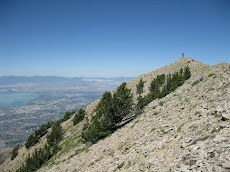I’ve run into Bob Aagard twice on campus and felt kind of dumb about it. He’s a total stranger, yet I know his face well and kind of feel like I know him–blogging is weird that way. So I was in a hurry (that’s a theme the last two weeks) and almost ran into him as I walked out of the bathroom and gave him a really weird look. He paused and in that split-second when you’re confronted with an unexpected situation and thoughts run through your head like “It doesn’t matter,” “Introduce yourself,” “No, play dumb,” “He’s probably busy and doesn’t care,” “I’ve got to be somewhere in 15 minutes,”etc., I managed:
“I know you from the bloghive.”That is probably not word-for-word perfect recall, but it was something to that effect.
“Oh. I could tell you looked at me funny.”
“Yea. It was because I recognized you.”
“Oh.”
Now I feel dumb for not introducing myself, but it was just one of those awkward moments when my brain was totally taken by surprise in the midst of trying to organize a huge to-do list while hurrying home. So good to see you Bob.
I also think I saw Alex Kirry from the Nightside Project walk by at the balloon festival in Provo on the morning of the 4th of July, but I’m not sure.
Now for something relevant to education. It has been interesting to see the tension between my professors and what they perceive as shortcomings in schools. My professors all taught in the public schools for some time before getting their Masters and Doctorates and moving to the university level. They all read and conduct educational research frequently. They’re not ranting passionately or anything, but in the course of discussion, various professors have brought up that they don’t feel that teachers pay enough attention to research or respect the findings of the overall field. They have been a little defensive as being perceived as living in the ivory tower and not remembering the realities of the classroom. And they're right that teachers often do think that certain studies or attitudes are not realistic.
I think that is an interesting dichotomy and that there’s some truth in what the professors are saying…but I also feel that they are inherently removed from classroom reality to a degree. From my vastly knowledgeable perch as two-week grad student and less-than-ten-year classroom teacher, I think that teachers do at times get caught up in day-to-day practicalities and lose sight of big picture type goals and what research has found. AND I think the researchers lose sight a little bit of how hard it is to implement ideal ideas with real classes of unique personalities. One professor said “You just don’t forget what teaching was like.” I totally agree, but you still start to gradually have other priorities and feel the burdens of your current situation while the memories of past obstacles fade by degree.
The professors also have a better grasp of the overall body of research rather than isolated studies from a media report or a professional meeting. They are not thrown when a study shows something seemingly odd or conflicting because the body of evidence will slowly point to a best practice. So there is often a difference in what a certain professor or body of researchers and currently practicing teachers believe about the “best” way to accomplish certain tasks in education. And the professors, national “experts,” different schools, and various studies within the body of research differ too. There are very few unanimously accepted ideas on literacy teaching, math teaching, character education, ESL teaching, school structure, etc. I think this stems partially from the impossibility of quantifying some things about teaching classes full of unique individuals. This uncertainty can be exciting as we find out more and improve, but it can also make people cynical as they hear differing ideas of “good” teaching from year to year or report to report.
I would think that tension would exist in all fields as new research points to better methods, but some specific ideas end up discredited after initial excitement, which sometimes leads to distrust or excuses about the other good ideas that represent changes in the normal way of doing things.
I think I’m rambling a little bit, but hopefully you can see what I’m saying. There are many commonly agreed-on principles in education, but there are many, many, many disagreements on everything from specific programs to larger methods and styles of teaching to the effectiveness of specific tests to underlying principles of how humans attain knowledge. This maybe shows why merit pay is not just an easy fix to the bad teachers out there. Some are lazy and they know it, but other perceptions may arise from honest differences in opinion about best practice. I’m not saying merit pay is impossible, but I am saying it’s complicated and that teachers are not just whiny obstructionists when they express concerns about exactly how they will be evaluated. I’m glad the legislature put the implementation in the hands of the districts to give local voices more input—that was a good move as long as they were throwing it in on the second-to-last day with minimal debate.
I have been planning on writing more about merit pay for months, but I will have to get to it soon with the new programs starting up. I also would like to write more about research and why it is often misread and misused. And UVU…and teacher political involvement (way less than Greg Curtis and Paul Rolly would have you believe)…and district split issues…and extended school year…and social promotion…and my interesting conversations with neighbors about education…and referendum restrictions in SB53 and SB54…and further discussion on how WPU, MSP, and other school funding is distributed… We’ll see how it goes.


